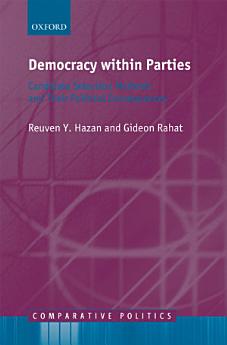Democracy within Parties: Candidate Selection Methods and Their Political Consequences
Jul 2010 · OUP Oxford
Ebook
224
Pages
family_home
Eligible
info
reportRatings and reviews aren’t verified Learn More
About this ebook
Can too much participation harm democracy? Democratic theory places great importance upon the conduct of elections, but it is not often recognized that the electoral game takes place in two arenas, not only between parties but also within them. This pioneering book presents a new approach to understanding political parties. It sheds light on the inner dynamics of party politics and offers the first comprehensive analysis of one of the most important processes any party undertakes - its process of candidate selection. Candidate selection methods are the mechanisms by which a party chooses its candidates for the general elections. It may be the function that separates parties from other organizations. For such an important function, this field has certainly faced a dearth of serious investigation. Hazan and Rahat, the leading scholars on this topic, conduct an in-depth analysis of the consequences of different candidate selection methods on democracy. This book is a culmination of almost two decades of research and defines the field of candidate selection. Part I of the book delineates candidate selection methods based on four major dimensions: candidacy; the selectorate; decentralization; and voting versus appointment systems. Part II analyses the political consequences of using different candidate selection methods according to four important aspects of democracy: participation; representation; competition; and responsiveness. The book ends with a proposed candidate selection method that optimally balances all four of the democratic aspects concurrently, and answers the question 'Is the most participatory candidate selection method necessarily the best one for democracy?' Comparative Politics is a series for students, teachers, and researchers of political science that deals with contemporary government and politics. Global in scope, books in the series are characterised by a stress on comparative analysis and strong methodological rigour. The series is published in association with the European Consortium for Political Research. For more information visit www.essex.ac.uk/ecpr The General Editor is Professor David M. Farrell, School of Politics and International Relations, University College Dublin.
About the author
Reuven Y. Hazan is a Professor in the Political Science Department at The Hebrew University of Jerusalem. His research interests cover parties and party systems, elections and electoral systems, and legislative studies. His publications include articles in Comparative Political Studies, Electoral Studies, International Political Science Review, Journal of Legislative Studies, Journal of Theoretical Politics, Legislative Studies Quarterly, Party Politics, Political Geography and various other journals. Gideon Rahat is a Senior Lecturer in the Political Science Department at The Hebrew University of Jerusalem. His research interests include political parties, candidate selection methods, electoral systems and the politics of electoral reform. He has written or collaborated on articles that appeared in Comparative Political Studies, Comparative Politics, Electoral Studies, Journal of Democracy, Party Politics, Political Communication, Political Studies and several other journals.
Rate this ebook
Tell us what you think.
Reading information
Smartphones and tablets
Install the Google Play Books app for Android and iPad/iPhone. It syncs automatically with your account and allows you to read online or offline wherever you are.
Laptops and computers
You can listen to audiobooks purchased on Google Play using your computer's web browser.
eReaders and other devices
To read on e-ink devices like Kobo eReaders, you'll need to download a file and transfer it to your device. Follow the detailed Help Center instructions to transfer the files to supported eReaders.






